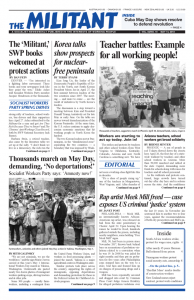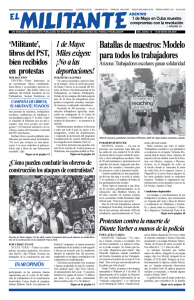AUCKLAND, New Zealand — Hundreds of nurses and other health care workers joined protests outside hospitals and clinics across New Zealand over two weeks starting April 9. They are demanding increased staffing, higher wages and an end to onerous working hours.
The actions underlined the workers’ rejection of the latest contract offer by New Zealand’s district health boards. Some 27,000 nurses, health care assistants and midwives are represented by their union, the New Zealand Nurses Organisation.
The rejected offer included a 2 percent wage increase and a 1,050 New Zealand dollars ($735) contract-signing bonus. A district health board spokesperson claimed that given the budget squeeze across the country’s health system, their offer was “right at the limits of affordability.”
Some 200 workers and supporters rallied outside Middlemore Hospital in South Auckland April 10. Banging on their union placards, they chanted, “Be fair, be fair, be fair to those who care.” Many passersby tooted their horns in solidarity.
“It’s not about the money so much as patient safety,” William Mai, who works as a health care assistant at Auckland City Hospital, told the Militant. “We just don’t have the staff to look after the patients.” Nurses launched a Facebook page, titled “New Zealand, please hear our voice.” Thousands have logged on to describe the problems they face from long hours to lack of respect from management.
At a 150-strong picket outside Christchurch Hospital, Nurse Sam Stott told the press April 13 that many of them face the extra financial burden of paying off student loans. Her debt totals NZ$39,000, she said.
“A lot of nurses want to strike. We won’t get what we need behind closed doors,” nurse Sala Ika told the Militant at the Middlemore action.
Over the next month starting April 23 the workers are voting by mail whether to authorize union leaders to prepare strike action. Under a New Zealand law restricting workers’ rights who labor in what they call “essential occupations,” any such strike would require 14 days notice, postponing such action until July at the earliest.
A strike proposal will depend in part on the recommendations of a panel appointed March 12 by the Labour Party-led government to address the “impasse” in the dispute. Representatives of the union, employers and government will take part in the body.
“For us the main thing is the recognition of our work condition and standard of nursing,” said Yvonne McKenzie, a nurse who has worked at Middlemore for 12 years in the area of Maori health. “We are in the poorest community and the bucks don’t seem to roll this way.”
“The moldy buildings need to be fixed,” she added. Many of the hospital’s buildings are badly damaged due to lack of maintenance.

